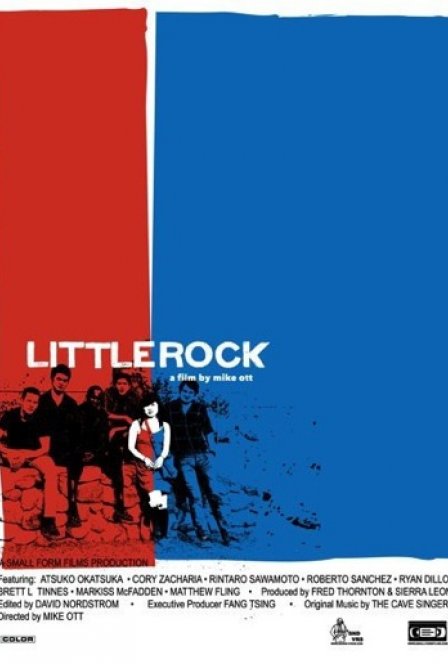Director Mike Ott and his second feature Little Rock have been heavily anointed in recent months, from winning the Gotham Award for “Best Film Not Playing At A Theatre Near You” to various “filmmaker to watch” distinctions. It’s a film that one might be tempted to file under the ever-fattening mumblecore category. But while the tag might fit the middle portion of the film, it doesn’t particularly fit its unique opening and closing scenes. The distinct bit perhaps comes from Ott teaming up with lead actress Atsuko Okatsuka to write the script, which details the existential wanderings of a Japanese brother and sister in small-town California.
Atsuko and her brother Rintaro (Rintaro Sawamoto) are unexpectedly stranded in Little Rock, a drifting pit stop off the highway to somewhere presumably more exciting and memorable. Rintaro is all business, eager to move their journey onward, but Atsuko seems oddly taken with the town, particularly with some of the young men she meets at a party they crash in their motel. Affable, ignorant Cory (Cory Zacharia) takes a shine to the siblings and acts as informal tour guide, never mind that he speaks no Japanese and very little English. He just speaks slowly, as if to schoolchildren, and blinks a lot. It’s a funny caricature of the dumb American, so unused to foreigners that he talks down to them. Rintaro quickly tires of hanging out under railroad tracks and at boring keg parties, but Atsuko begins a pale flirtation with hair-tossing Jordan (Brett Tinnes), and when the time comes to move on, she refuses to go with her brother.
There are lots of pretty scenes of Atsuko as she traverses her new landscape, often by bike and in the company of one of her Little Rock beaus. Not that life is a golden dream — she awkwardly takes a room, and eventually a job, with Cory and his aggressive father, and indeed sleeping with Jordan proves an unmemorable introduction to casual hipster sex. I don’t know what America she had been hoping for, but I imagine this dusty town and its lost residents must be a disappointment. Atsuko’s keen, expressive face relays subtle emotions and impressions with grace, but I wish she had been given more opportunities to speak. The language barrier is a key narrative point, and it’s interesting to watch everyone around her project their desires and impressions on Atsuko, but her character ends up being a missed opportunity.
When a contrite Rintaro finally returns for her, Atsuko seems glad to leave. From there, Ott interestingly sends them to Manzanar, the site of a World War II internment camp for Japanese-Americans. It’s a nicely realized moment where we understand their trip is not only a voyage of American discovery, but also a painful family pilgrimage. Atsuko makes a last attempt via payphone to say goodbye to Cory, who after all did show her kindness, but keeping in line with the rest of the film, they can’t understand each other and she hangs up the phone with resignation.

